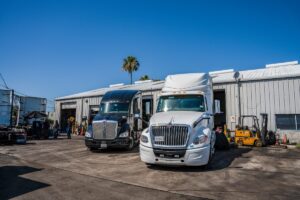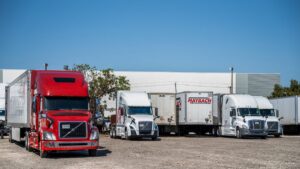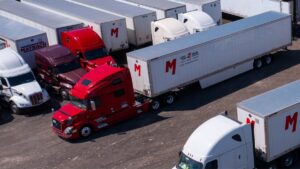Being an owner-operator in the trucking industry offers the freedom of running your own business, but it’s not without its financial challenges. Understanding the comprehensive breakdown of costs is crucial for maintaining profitability. This article will explore the essential expenses every trucking entrepreneur should consider, highlighting how to manage expenses and the balance between fixed and variable costs.
Fixed costs, such as insurance premiums and truck payments, remain constant regardless of miles driven. In contrast, variable costs like fuel and maintenance fluctuate with the distance traveled. Balancing these expenses is key to maximizing profit margins. We’ll also discuss how regular maintenance can keep your truck in optimal condition, reducing downtime and unexpected repairs.
By understanding these financial dynamics, owner-operators can better navigate the complexities of the trucking business, ensuring a more profitable and sustainable operation.
Fixed vs. Variable Costs
Owner-operators face a mix of fixed and variable costs. Fixed costs stay the same regardless of miles driven. These expenses include truck mortgage payments and insurance premiums. For example, a typical truck mortgage payment can be around $1,500 monthly, while insurance premiums might cost $800 monthly. These expenses are predictable and remain steady.
Variable costs, on the other hand, fluctuate based on mileage. Fuel is the most significant variable cost. If fuel is $3.50 per gallon and a truck averages 6 miles per gallon, driving 1,000 miles will cost about $583 in fuel. Other variable costs include maintenance, tires, lodging, food, and tolls. Maintenance can range from $0.10 to $0.15 per mile. Tire expenses and tolls can also add up, especially over long distances.
Balancing these costs is vital. Fixed costs are predictable but relentless, occurring even during downtime. Variable costs align with business activity and increase with mileage. Subsequent sections will delve deeper into strategies for optimizing these costs and maximizing profitability.
Maintenance
Maintenance costs for owner-operators are variable and can complicate budgeting. Regular and preventive maintenance, including routine inspections and basic servicing, is crucial to minimize unexpected repairs. Setting aside an emergency fund, ideally $4,000, specifically for repairs can prevent financial strain. DIY repairs can also save money if the operator has the necessary skills while opting for quality used parts further reduces costs. Keeping detailed maintenance records helps track and prevent recurring issues, aiding in better budgeting and potentially increasing resale value. Effective maintenance management extends truck longevity and reliability, ensuring cost control and sustained profitability.
Fuel
Fuel is crucial for an owner-operator’s trucking business and one of its largest expenses. Choosing the right truck is essential for managing these costs effectively. Investing in fuel-efficient trucks and adopting fuel-saving practices can reduce costs. Though initially pricey, fuel-efficient trucks can save up to $20,000 annually. Utilizing fuel discount programs and fuel cards and implementing a fuel surcharge to cover fluctuating fuel prices can provide additional savings, potentially reducing costs by thousands yearly. Effective route planning and operating the truck at its engine sweet spot also help minimize fuel consumption. Implementing these strategies enables owner-operators to manage and reduce fuel expenses, ensuring better financial sustainability in the trucking industry.
Truck Insurance
Truck insurance is an essential expense for owner-operators. It offers protection in case of accidents, theft, or damage. Various types of truck insurance cater to different needs, ensuring your business and assets remain secure.
Commercial Truck Insurance
Owner-operators need comprehensive commercial truck insurance. This type of insurance covers the truck and its cargo. It’s crucial because it safeguards against unforeseen incidents. On average, anticipate spending $12,000 annually for liability and physical damage coverage. Depending on your driving history and coverage levels, these costs can be higher or lower.
Liability Insurance
Liability insurance is mandatory by law. It covers damages and injuries if you’re involved in an accident. For an owner-operator, the annual cost hovers around $6,000. This insurance is a non-negotiable aspect of operating legally on the roads.
Cargo Insurance
Cargo insurance protects the goods you transport. This coverage is essential if the cargo gets damaged or stolen during transit. The cost of cargo insurance varies widely based on the type of goods and coverage limits. Expect to pay between $400 and $1,800 per year.
Cost Variability
Insurance costs aren’t static and can fluctuate based on several factors. Your driving history, the type of cargo you transport, and the coverage levels you select all play a part. By understanding these costs and planning accordingly, you can better manage your budget and ensure your business remains profitable. Truck insurance provides the security you need when operating as an owner-operator. By covering major expenses like liability, physical damage, and cargo insurance, you help protect your investment and business.
Taxes
Owner-operators must manage taxes to maintain their financial health. The IRS requires them to make quarterly estimated tax payments based on business profits. These payments include self-employment tax, federal income tax, and state income tax.
Federal and State Income Tax
Federal and state income taxes depend on tax brackets and individual state regulations. These are calculated on the annual tax return but must be estimated and paid quarterly to avoid penalties.
Record Keeping
Detailed record-keeping is crucial. Accurate records of income and expenses help you file taxes correctly and take advantage of all deductions. Maintenance, fuel, and other operational costs should be documented meticulously.
Tax Deductions
Owner-operators can claim various deductions. These include fuel, maintenance costs, and home office expenses if they have a dedicated space for business purposes. Setting aside a portion of rent or mortgage can provide significant tax benefits.
Professional Guidance
Consulting a tax professional is recommended. They can help comply with tax regulations and maximize available deductions, ensuring that owner-operators avoid penalties and manage their tax liabilities effectively. Understanding and managing taxes is essential for owner-operators in the competitive trucking industry. This responsibility includes calculating quarterly payments, keeping detailed records, and leveraging tax deductions, greatly affecting profitability and financial stability.
Health Insurance
Health insurance is vital for owner-operators, providing financial protection against illness or injury, and essential for those who depend on their driving ability. Unlike employees, owner-operators must buy their plans, allowing customization based on individual needs. Costs vary, with basic plans being cheaper and comprehensive ones more expensive. Monthly premiums for a healthy single individual range from $200 to $400 but can increase with family coverage or pre-existing conditions. Deductibles range from $1,000 to $5,000 annually, and out-of-pocket maximums from $5,000 to $10,000. Securing insurance ensures access to medical care and peace of mind, safeguarding the health and financial stability. Exploring different providers or using brokers can help select the most suitable plan, making insurance an essential expense and investment for owner-operators.
Food and Drink Expenses
Food and drink costs are a significant challenge for owner-operators. Eating out daily is expensive, potentially reaching $1,350 per month. The IRS offers an 80% Per Diem tax deduction to help mitigate these expenses, but wise budgeting is still necessary.
Maintaining a healthy diet can be even more challenging for owner-operators navigating irregular schedules or tight deadlines, especially those involved in expedited trucking services. However, using a small refrigerator and microwave in the truck and purchasing groceries can drastically reduce costs. Stocking up on non-perishable items like granola bars, meal planning, and using reusable water bottles are practical strategies to manage expenses and maintain a healthy diet. These measures help owner-operators manage their food costs while staying healthy and focused, even on demanding routes or schedules.
Documentation and Licensing
Owner-operators must handle a multitude of documentation and licensing requirements. The FMCSA insists CMV operators maintain vehicle maintenance files for at least 12 months and roadside inspection reports for 14 months. Failure to comply can lead to fines and operational delays.
Commonly needed documents include:
- Business Licenses: Essential for legal operation.
- Driver’s License Renewal Fees: Approximately $50 to $100, depending on the state.
- US DOT Registration: Usually costs around $300.
- Unified Carrier Registration: Costs vary based on fleet size, starting at $59.
- Vehicle Inspection Fees: Typically $50 to $100 per inspection.
- State Transportation Permit: Fees differ by state.
- International Fuel Tax Agreement (IFTA) Decal: Around $10 per truck, plus quarterly taxes.
- Heavy Vehicle Use Tax (HVUT): Generally $100 to $550 annually, based on vehicle weight.
Proper documentation prevents legal troubles and helps build a positive reputation. Budgeting for permits and licensing is necessary to avoid unexpected expenses. Consider professional services for bookkeeping, accounting, and legal advice. Experts can help ensure compliance and save money. Brokers can help secure loads, though fees apply. Negotiate rates to ensure earnings cover expenses and yield profit. Factoring services offer upfront payment for invoices, aiding cash flow but at a cost. Factor these expenses into rates and contracts. Maintaining compliance with documentation and licensing helps avoid fines. It ensures smooth operations and upholds the business’s reputation.
Professional Services
Owner-operators invest in professional services to manage non-driving business aspects, ensuring compliance and efficiency despite costs. Bookkeeping services cost $300 to $500 monthly while accounting services are $75 to $200 per hour. Legal services for regulatory compliance and disputes charge $150 to $300 per hour. Tax preparation costs $400 to $1,000, aiding in identifying deductions. Broker fees for securing loads range from 10% to 20%, and factoring services, improving cash flow, charge 1% to 5% of invoice value. Effective management of these costs contributes to long-term success.
Conclusion
Understanding both fixed and variable costs is crucial for owner-operator profitability. Regular maintenance and fuel-saving strategies are key to maximizing profit. Proper insurance, tax management, and meal planning are essential expenses. Maintaining compliance with documentation and licensing ensures smooth operations. While professional services have a cost, they can save time and money in the long run. By effectively managing these expenses, owner-operators can navigate the trucking industry toward success.







